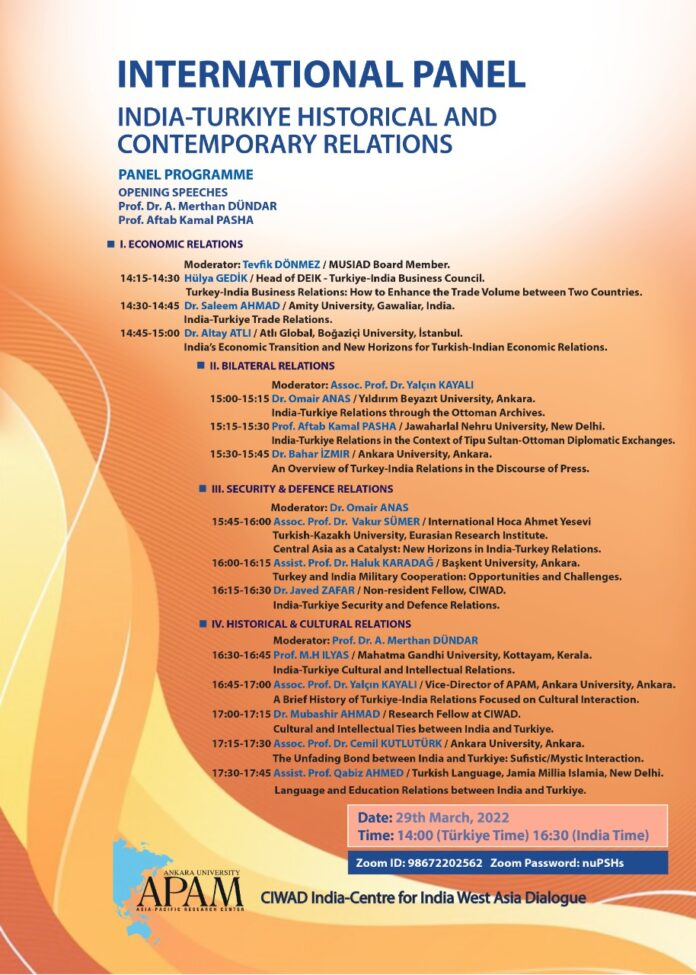Prominent Academicians and Researchers from India and Turkey discuss various Dimensions of Bilateral Relations
‘Tipu Sultan, the ruler of the Mysore region of India learned about modernizing the infrastructure when his delegation visited Istanbul and many parts of the Ottoman Empire’, said Prof. Aftab Kamal Pasha, former professor at Jawaharlal Nehru University, India and director of Delhi based Centre for India-West Asia Dialogue..
Prof. Pasha was speaking on India-Turkey relations in the context of Tipu Sultan-Ottoman diplomatic exchanges in an online international panel jointly organized by the Centre for India West Asia Dialogue and Ankara-based the Asia Pacific Research Center on Tuesday.
The international panel under the title “‘India-Turkey Historical and Contemporary Relations’ was attended by prominent academicians and researchers from Indian and Turkish universities. The speakers presented their papers on historical, cultural, and economic ties between the two countries.
Prof. Pasha further said that Tipu Sultan had reached out to the Ottomans as he was not recognized by his neighbor rulers, which helped him get recognition and favor of the Ottoman Sultan. He asserted that diplomatic, political, religious, and commercial ties became important in the second half of the eighteenth century which led to the foundation of the much closer ties between India and Turkey in the subsequent period.
In their inaugural speeches, the director of APAM, Ankara University Prof. Merthan Dündar and Prof. Aftab Kamal Pasha, Director of CIWAD agreed that India and Turkey have yet to advance their relations to its full potential in all sectors including trade, culture, and strategic relations.
Bahar Izmir, Research Assistant from Ankara University, enlightened on the bilateral relations in the discourse of the Press in Turkey and India between 1923 and 1947.
‘The abolition of the Caliphate in Turkey was shocking for the Indian Muslims. They saw it as a break from tradition but later on with the efforts of modernization in Turkey began, it was seen as a model for India,’ she said.
‘Women’s position in Turkey was shown as a role model to Indian women and it led to the demand for reforms for Indian women. The Turkish example was highlighted in the Indian press,’ she added.
Focusing on the civilizational and cultural interactions between the two countries, Yalcin Kayali of Ankara University highlighted that many ancient Indian texts and Hindu religious sculptures have been translated into the Turkish language.
‘Many commentaries and studies about Ayurveda have been conducted here in Turkey. Many medical doctors in Turkey have a special interest in Ayurveda,’ he noted.
Dr Javed Zafar, Non-Resident Fellow at CIWAD, Dr Vakur Sumer of Hoca Ahmet Yesevi Uluslararası Türk-Kazak Üniversitesi, Avrasya Araştırma Ensititüsü, and Dr Haluk Karadağ, of Başkent University discussed defence and security cooperation between India and Turkey. Dr Haluk offered that both countries have managed to overcome their differences and have cooperated. India’s inviting Turkey to build one of its shipyards, a tunnel in Ladakh, Kashmir, and buying small drones from Turkey are small yet important indicators of confidence and trust between the two nations. Dr Sumer pointed out that the crisis in Afghanistan has brought new concerns on which India and Turkey have an opportunity to cooperate and offer better security conditions across Central Asia and Eurasia. Dr Javed Zafar highlighted that Turkey has successfully emerged as a hub of effective and economic armory becoming an exporter of arms. India being a non-aligned nation has always tried to diversify its relations and source of arms.
Dr. Saleem AHMAD, Assistant Professor from Amity University, Gwalior, India, .Dr. Altay ATLI / Atlı Global, Boğaziçi University, İstanbul, and Tevfik DÖNMEZ of Musiad, and Hülya GEDİK, head of DEIK – Turkiye-India Business Council discussed the current state of trade relations and the ways to expand trade relations between India and Turkey. The speakers pointed out tourism, education, health care, infrastructure development, and agriculture as new fields of cooperation. The two countries can easily surpass their target of reaching ten billion dollar bilateral trade.
Dr. Omair Anas, Assistant Professor at Ankara’s Yildirim Beyazit University introduced the Ottoman Archives on India-Turkey historical relations which, he said, shed light on Sufi, trade, military, cultural, and state to state cordial relations. Indian rulers and people had sent their generous financial help when Turkey was fighting her war of independence.
Late Ottoman newspapers also showed great interest in the Indian political movement against British colonialism and had Ottoman intellectuals came in support of India’s independence struggle. Turks, however, never expected and were not prepared for the tragic partition of the subcontinent. Turkey had to reset its once One India perspective into the reality of two and then three sovereign nation states, India, Pakistan, and Bangladesh.
The Cold War had only complicated their perspective until the end of the cold war when India and Turkey actively pursued common interests. The current international situation offers another opportunity to rebuild their historical relations.
The organisers will publish the seminar papers in book format soon.
Prepared By Hammadurrahman (Research Assistant)


